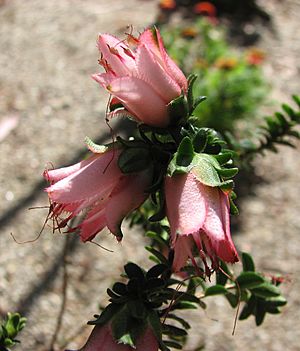Fringed mountain bell facts for kids
Quick facts for kids Fringed mountain bell |
|
|---|---|
 |
|
| Conservation status | |
| Scientific classification |
|
| Kingdom: | Plantae |
| Clade: | Tracheophytes |
| Clade: | Angiosperms |
| Clade: | Eudicots |
| Clade: | Rosids |
| Order: | Myrtales |
| Family: | Myrtaceae |
| Genus: | Darwinia |
| Species: |
D. squarrosa
|
| Binomial name | |
| Darwinia squarrosa (Turcz.) Domin.
|
|
| Script error: The function "autoWithCaption" does not exist. | |
Script error: No such module "Check for conflicting parameters".
The fringed mountain bell (also called the pink mountain bell) is a special kind of shrub. Its scientific name is Darwinia squarrosa. This plant grows naturally only in the southwest part of Western Australia. It's a unique plant found nowhere else!
Contents
What the Fringed Mountain Bell Looks Like
The fringed mountain bell is a shrub that stands upright. It can grow to be about 0.2 to 1 meter tall. That's like 8 inches to 3 feet! Its flowers are surrounded by special leaf-like parts called bracts. These bracts hang down like a bell. They are usually red or pink. You can see these beautiful "bells" mostly from August to November.
How the Fringed Mountain Bell Got Its Name
This plant got its first scientific name in 1852. A botanist named Nicolai Stepanovitch Turczaninow named it Genetyllis squarrosa. Later, in 1923, another botanist named Karel Domin moved it to the group of plants called Darwinia.
The second part of its scientific name, squarrosa, is a Latin word. It means "rough with stiff scales." This describes how some parts of the plant might feel.
Where the Fringed Mountain Bell Lives
The fringed mountain bell grows on rocky slopes. You can find it on the eastern peaks of the Stirling Range National Park in Western Australia.
Why the Fringed Mountain Bell Needs Protection
The fringed mountain bell is considered "vulnerable." This means it's at risk of disappearing in the future. The Australian Government lists it as "vulnerable" under a special law. It's also called "Threatened Flora" by the local environment department. This shows how important it is to protect this unique plant.
Growing Fringed Mountain Bell in Gardens
If you want to grow a fringed mountain bell, it needs good drainage. It also needs some shade from the direct sun. It's hard to grow new plants from seeds. But you can easily grow them from cuttings. If the soil isn't right, you can even graft it onto another plant. A common plant used for this is the Darwinia citriodora.
 | William Lucy |
 | Charles Hayes |
 | Cleveland Robinson |


